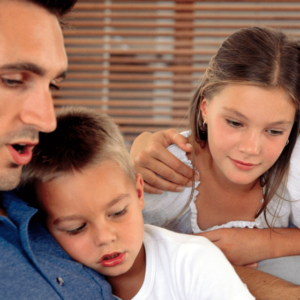Everywhere you turn people are talking about the Novel Coronavirus (COVID-19). This unprecedented pandemic is affecting nearly everyone and everything – from school closures and job loss to the cancellation of special events to limited interaction with friends and family.
If the news of these uncertain and unusual times is impacting how you are feeling, it most likely is impacting the children in your household too.
Kids and teenagers alike need adults to help them put something like COVID-19 into perspective. It is important to create an open and supportive environment where children can ask questions… and if they are not asking, then start a conversation. If you’re not sure how to start the conversation, below are some tips on how to talk to kids and teens about COVID-19.
- Assess what your child already knows. Start by asking them what they may know about Coronavirus and clarify any inaccurate information that they may have heard.
- Stay calm throughout the conversation. Even though you may be concerned yourself, it is important to remain calm when talking about the virus. Children will look to you to see how afraid they should be.
- Talk at an age-appropriate level. Keep things simple and useful. Use words and concepts that children can understand. Gear your explanation to the child’s age, language, and developmental level. We found these Facts Sheets from the CDC that might be helpful when talking with your children.
- Do not dismiss your child’s fears. Listen to your child while they are talking and don’t gloss over any fears they may have. Validate their concern. In a calm voice, address their feelings and help them come up with solutions to reduce their anxiety and distress.
- Reassure them that they are safe. Let your kids know what is being done to help keep everyone safe and healthy. And emphasize simple things they can do to protect themselves, their family and friends.
- Limit the amount of news the family is watching. Control how much time children are watching COVID-19 news coverage on the television or on their devices. Too much news can be disturbing and confusing.
- Reinforce good hygiene. One way to stop the spread of the Coronavirus is to practice good hand hygiene. Make sure your kids are washing their hands for at least 20 seconds before and after meals, after they go to the bathroom, after they come in from outside and after they’ve blown their nose or put their hands in their mouth.
- Continue to have open conversations. The coronavirus pandemic is a health concern for the young and old. New information and details on the spread of the virus are updated frequently. It is important to continue to talk with your child about how they are feeling and what new questions they may have about the disease.
Children of all ages can feel frightened and confused. As parents and caring adults, we can best help by listening and responding in an honest, consistent, and supportive manner.
At FirstLight Home Care we remain available to provide much-needed care to the people who need us most. We can even run errands, deliver food and supplies or pick up prescriptions. If you need our help, find a location near you.
SOURCES
Healthline: www.healthline.com
Centers for Disease Control and Prevention: www.cdc.gov
PBS Kids’ for Parents: www.pbs.org
UCHealth: www.uchealth.org
